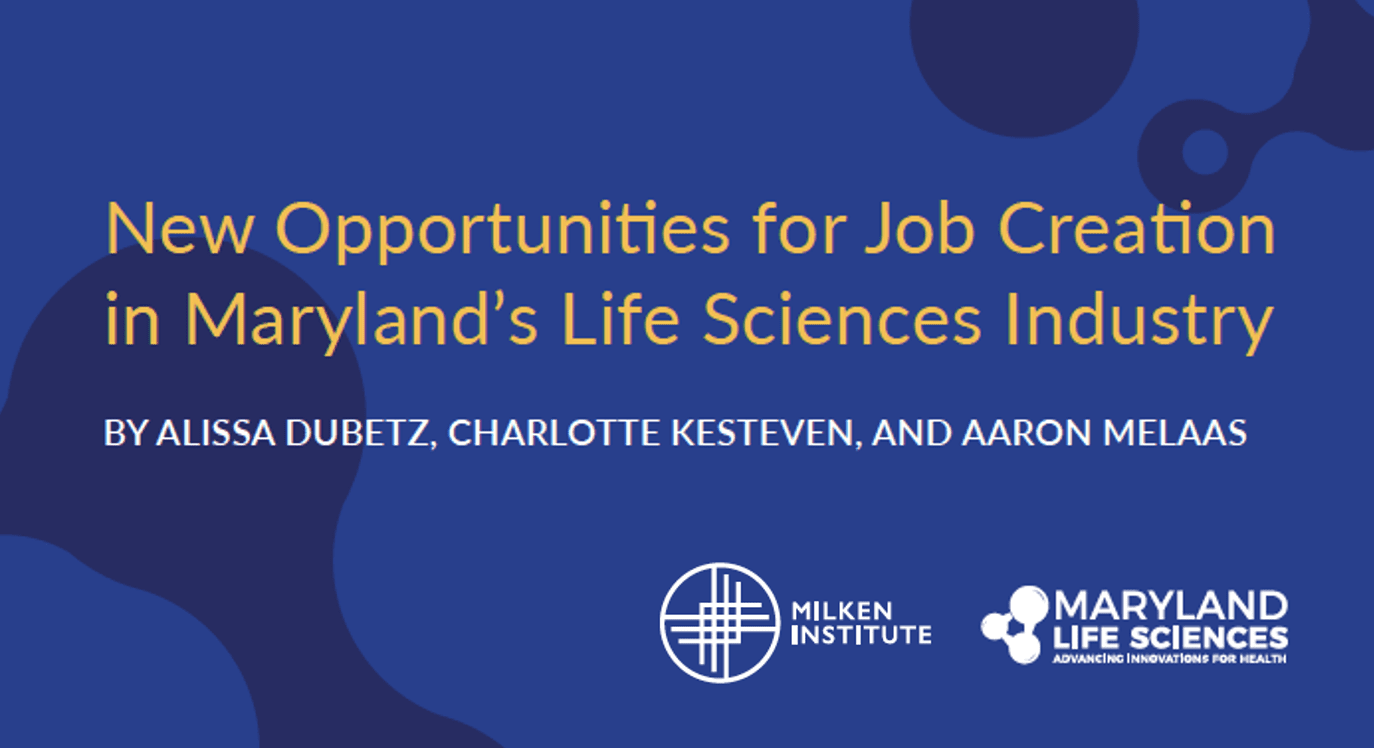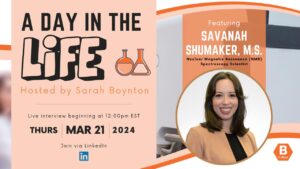
Milken Institute Report Highlights How Maryland is Growing one of the Nation’s Strongest
Life Science Ecosystems
Home to an array of renowned universities, federal labs, and government resources, it’s no surprise that the globally renowned Milken Institute found that Maryland “has one of the nation’s strongest life sciences industries,” according to its recent report.
It’s clear that Maryland’s efforts to grow its recognition as a life sciences/biotech hub have paid off. However, there is still more work to be done in order for Maryland’s R&D growth trajectory to keep up with other leading hubs such as Massachusetts and North Carolina.
The report identified the key areas and programs that Maryland should continue to focus on in order to continue attracting and retaining a top-notch workforce and entice venture capital:
- Collaborate on developing an industry-certified training curriculum that maximizes the number of workers capable of meeting existing industry needs and that prepares prospective employees for occupations with future growth potential, particularly jobs that do not require four-year degrees.
- Increase awareness of life sciences career opportunities for residents in more rural counties through industry skills training extension programs hosted by community colleges.
- Support dedicated training programs and facilities for advanced biomanufacturing, especially cell and gene therapies.
If you look around, it’s easy to see that the foundation is already here – both figuratively and literally! The report noted that Maryland already has many of these substantial assets already in place – it’s now all about capitalizing these assets to their fullest potential.
Tilling the Fields
From young professionals to seasoned industry veterans to budding entrepreneurs, people are realizing the rich opportunities that Maryland has to offer. Montgomery County has traditionally been considered the central hub of all things Maryland biotech and life sciences due to its close proximity to the NIH, the FDA, and a multitude of federal resources. However, increasing demands for lab space have inspired companies to also look north…northwest along I-270, to be exact.
Frederick County is now growing a unique and bustling life sciences hub of its own, with companies and talent flocking to take advantage of newly developed lab spaces.
Currently over 80 life science businesses call Frederick County their home, including AstraZeneca, Thermo Fisher, Kite Pharma, Lonza, Leidos, and RoosterBio, among many others. And with numerous companies building up new laboratory space, it’s clear that Frederick is just getting started.
I-270 Innovation Labs co-founders Doug Bane and Luis Rugeles have seen the immense opportunity at hand and are working hard to fill the every-growing demand for laboratory space. They have developed a newly renovated 22,000 square-foot building in Frederick where up-and-coming entrepreneurs and biotech companies can begin to establish their roots. Nestled in the Westview Business Park at 5107 Pegasus Court, the I-270 Labs provide affordable lab space and flexible accommodations to meet the needs of all levels of entrepreneurs, from those who are just getting on their feet to those that are looking to create a satellite campus for their expanding business. Whether one requires a BSL-2 wet lab to conduct experiments at the bench or a high-powered dry lab capable of meeting demanding computational needs, I-270 labs is poised to be a tremendous catalyst for life science job growth in Maryland.
This past spring, VaLogic also acquired a vacant 75,400 square-foot building to renovate and outfit with manufacturing capabilities to further support small to medium-sized life science companies in the area. Matan Companies, a Frederick-based real estate developer, is also answering the call and is geared to deliver 2 million square feet of manufacturing space through Progress Labs, equating to about 10,000 new job opportunities on the I-270 Tech Corridor. Beckham Gumbin Ventures has also begun construction to develop Ballenger Bio, which will offer several 3,000 to 7,000 square foot R&D laboratory spec suites to bolster growing life science businesses.
It’s clear that the field has been prepped – now it’s all about sowing the seeds of innovation that will yield the technologies and medicines of tomorrow.
Key Educational Resources to Forge Tomorrow’s Workforce
No matter how rich the soil, a farm cannot prosper if it doesn’t have the right people to tend to it. Similarly, a growing life sciences community cannot thrive if it cannot train and retain top talent – and that’s what many Maryland community colleges are working with industry professionals to ensure.
From Frederick Community College to Montgomery College, Maryland’s community college systems are answering the call, working closely alongside industry experts to offer top-notch educational and training programs that will make local residents shine to any employer.
Frederick Community College offers three levels of biotechnology training programs to accommodate any student’s needs and desire to learn the ropes of biotech – whether they are fresh high school graduates or well into their careers. Students not only learn from their professors in the classroom, but they receive specialized hands-on training on the equipment they would be using in the industry. And even sweeter still, the program hosts guest lectures from local industry leaders to help students gain a 360° perspective of the industry and build the necessary networks to be successful. Flexible class schedules also make these training programs accessible and achievable to those who juggle other commitments such as work or family.
This fall Frederick Community College also introduced a new Logistics and Production Technology program to provide further workforce training opportunities for in-demand industries. The program has three different track offerings – supply chain, biotechnology systems and maintenance, and manufacturing.
Montgomery College also offers an array of training opportunities for individuals at all caGSKreer levels. The college’s renowned BioTrain program offers a plethora of free, short workshops that equip individuals with the foundational skills needed for success in a life sciences career – whether it be learning about protein purification techniques and the drug development process to building soft skills such as negotiating and speaking with confidence. For those wishing to gain more advanced, specialized skills, the Bio-Trac program offers hands-on workshops where participants have the opportunity to dive in deep and take full advantage of Montgomery College’s state of the art facilities and training labs at the Bioscience Education Center, learning everything from flow cytometry to CRISPR to next-generation sequencing and beyond.
And just last week, we highlighted a unique GlaxoSmithKline and Montgomery College partnership where high school graduates and first-year college students have the opportunity to earn a respected biotech associate’s degree while also gaining relevant work experience through GSK. It’s through these synergies between industry and educational systems that Maryland will continue to prosper.
On the industry side, the same companies that develop breakthrough technologies can be enlisted to help identify the skills that an expanded life sciences workforce will require, and on the government side, expanding laboratory and manufacturing space can entice more local innovators and entrepreneurs to remain in Maryland as they expand. Preparing Marylanders to fill these positions will provide an incentive for employers to invest in creating more local jobs in these sectors, particularly since the state can already leverage its extensive assets in the knowledge economy to stimulate additional investment. – Milken Report, “New Opportunities for Job Creation in Maryland’s Life Sciences Industry”
It’s incredible to reflect on how Maryland has grown its life science capabilities in recent years – not only in bringing jobs to the area, but also in establishing the groundwork, infrastructure, and collaborations for further growth and success. Maryland’s college systems are working tirelessly to provide tomorrow’s workforce the skills they need to thrive, while companies are hard at work building the laboratories needed to house and foster those skills.
The foundation is ready – now let’s keep growing!
To read the full Milken Institute report, visit www.mdtechcouncil.com.
- About the Author
- Latest Posts
Sarah Ellinwood is BioBuzz’s Managing Editor. A scientist by training and a science communicator at heart, Sarah specializes in making complex concepts understandable, engaging, and exciting. She received her Ph.D. in molecular and cellular biology with a focus in infectious disease immunology from the University of Maryland and is passionate about all things related to scicomm, peer mentorship, and women in STEM.







